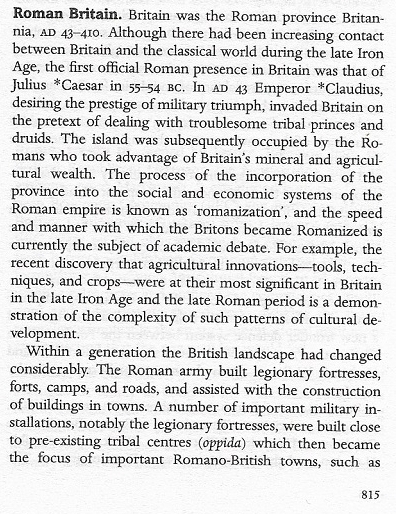“I drafted and re-drafted that piece dozens of times, hitting the ‘word count’ function over and over and over again. By the time I’d finished I think I was probably working for £1 an hour and feared infamy awaited me as the Romanist who shoved Roman Britain onto the pages of the Oxford Companion by sheer brute force.”
'How would you like to do a small job?' asked Martin Millett. 'It's paid,' he added helpfully. (Doesn't that say something about archaeology, when it's a bonus to be paid for one's labours.) I asked what it was, and he said it was a simple writing job for a new encyclopedia on British History. They wanted some stuff on Roman Britain and, if I had the time, it would be right up my street.
Oh that sounds great, I said. So Martin put me in touch with the editor, Professor John Cannon, and forward we went on our great word-restricted, tightly-written adventure. Fifty quid a thousand words and a free copy of the finished weighty tome, The Oxford Companion to British History. I was on my first maternity leave - what could possibly go wrong?
I could easily write 1,200 words on this wonderment of Roman Britain alone. Actually, that's not a bad idea ... coming soon ... Photo credit: Leeds City Museum
John's first request was 'Roman Britain' in 1,200 words. Possibly 1,199 words, but definitely no more than 1,200. The year was 1996 and there were plenty of general tomes, journals and monographs on my shelves to use as sources, as well as the buzzing cacophony of thoughts in my head.
I had the first feeling of unease as I stared at Frere, Salway, Todd, Reece, Johns & Potter, Millett, alongside stacks of books and off-prints on villas, the army, frontiers, towns, roads, invasions, the economy, religion, decline and fall. What on earth did I think I was doing? How would I condense so much information about material culture and literary sources, and so much previous and ongoing scholarship, into a short summary? Knowing my own fondness for, let's be honest, banging on about stuff, I suspected I'd be hard pressed to stick to 1,200 words on the Aldborough wolf mosaic, let alone the history of the whole bloody province.
I drafted and re-drafted that piece dozens of times, hitting the 'word count' function over and over and over again. By the time I'd finished I think I was probably working for £1 an hour and feared infamy awaited me as the Romanist who shoved Roman Britain onto the pages of the Oxford Companion by sheer brute force.
Happily, as I recall, the piece was accepted without revision (or maybe I dreamed that), and much of my stuff survived the revisions of others for the Companion's 2nd edition - but never again will I actively want to do encyclopedia work. I didn't enjoy reducing complex concepts to expressions like 'humbler farmsteads' but when it's either that or omitting mention of 5th century Wroxeter, I guess you make your choices.
Even Wiki, with its pages and pages on category after category, is a bit of a minefield for the contributor. Are these even meaningful categories? Who says that these are the ideas and discoveries that matter? What's sitting in the archives and the grey literature? How is the concept of 'romanization' coming along these days, and is androcentrism still evident? It is not easy summarising 'Roman Britain'.
For anyone who does take up the challenge in the future, I can only offer this advice. Be bold. Have a handful of big ideas about the topic that most of your contemporaries will broadly agree with, allude to past, current and developing thinking, don't quote your own PhD and lock the wine away - you're going to need a clear head and a clear deck.
The thumbs up from John Cannon meant that he asked me to write some more pieces. My particular favourites, if favourites is the right term, were the Roman Legions in 200 words - that was knuckle-biting - and Vortigern in 100. It was like telegraphing in essays.
However, little did I realise at the time, gripped as I was by some kind of axiological angst, that these ruthless and spartan summaries were going to prove very good practice for participation in the later inventions of blogging and Twitter. So thank you, Martin and John, for inadvertently helping to future-proof me :)
Anyway, I won't go on.






